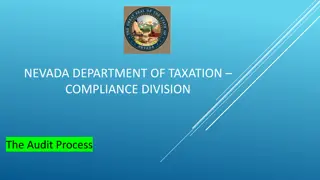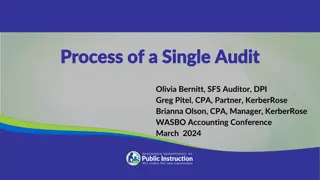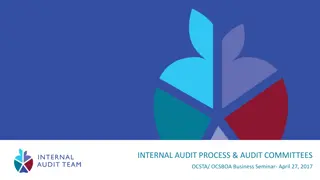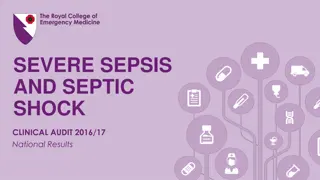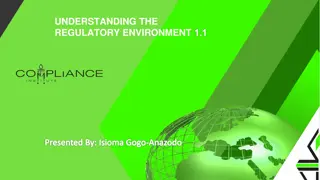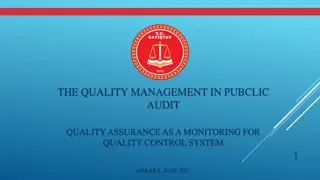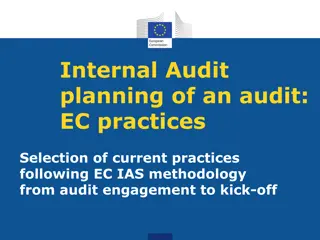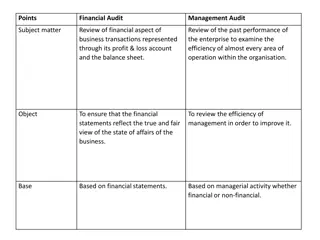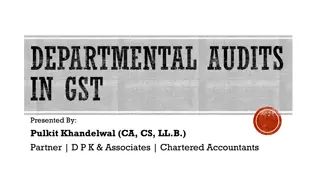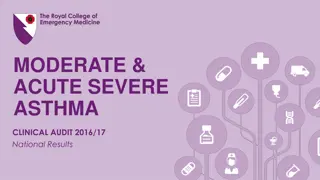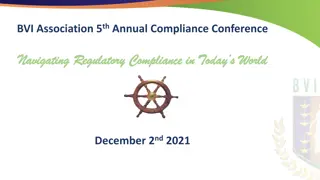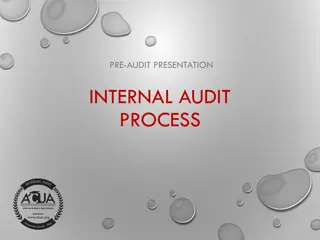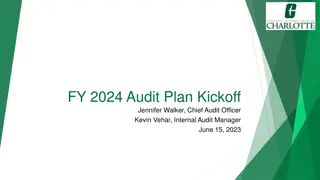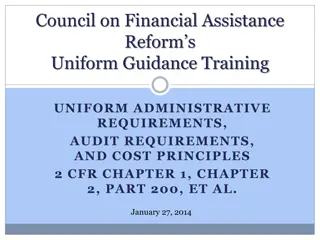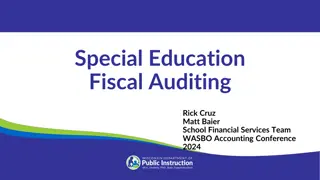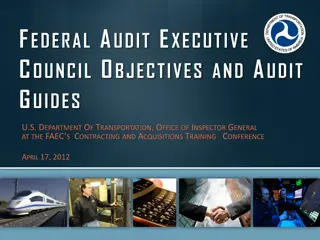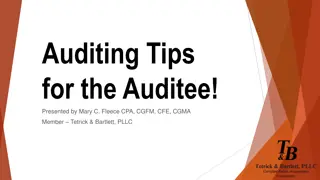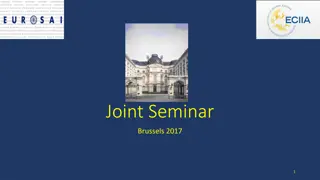Regulatory Compliance and Audit Operations Overview
Rosemary Carter, Associate Director of Regulatory Compliance, leads the Regulatory Compliance team at Ofqual. The team focuses on conducting audits, investigations, and recognizing awarding organizations to support AS and A-level reform. The Audit team ensures independence and impartiality in assessing compliance with General Conditions. Audits are conducted fairly and transparently, with organizations given opportunities to provide evidence. The commissioning model ensures accountability and thorough reporting of audit findings to the operations board.
Download Presentation

Please find below an Image/Link to download the presentation.
The content on the website is provided AS IS for your information and personal use only. It may not be sold, licensed, or shared on other websites without obtaining consent from the author. Download presentation by click this link. If you encounter any issues during the download, it is possible that the publisher has removed the file from their server.
E N D
Presentation Transcript
Audit and Compliance Rosemary Carter Associate Director of Regulatory Compliance
Today I will Tell you about the Regulatory Compliance team Talk to you about how we will operate an audit and an investigation Advise you what to expect from an audit or investigation Tell you about our commissioning process Update you on our recognition process
The Regulatory Compliance team Audit Investigation Recognition of awarding organisations Support of AS and A level reform We provide a service across the business Work commissioned by any team in Ofqual Activities are determined according to regulatory priorities which are determined by risk, we don t decide
The Audit team The Audit team is not a relationship team All awarding organisations are treated the same Independent and unbiased Auditors are rotated Professionally trained auditors Some staff have received professional investigation training Audit is about your compliance with our General Conditions You will always have an opportunity to provide clarity on the evidence
How our audits work We assume that all awarding organisations comply with our General Conditions All opinions we give are based on evidence We apply a consistent, fair and transparent process You are given every opportunity to assure us We are clear on our role as the regulator and your role as a regulated awarding organisation Based on good principles of regulation we consider the assurance you provide to us will be proportionate against what we are auditing i.e. market share, general or vocational qualifications, level, public funding, size of organisation, etc.
The commissioning model The audit team is independent from other teams in Ofqual Standards teams decide on the audit they want to commission All commissions are governed by an operations board led by a member of our senior management team The team cannot refuse a commission but do advise on resources, cost and methodology At the end of the audit, we submit our report to the commissioning team Everything in our audit report will be evidenced based Important: check your evidence record to ensure it s an accurate account of what you ve provided for the audit
We have the authority to investigate Sections 149 and 154 of the Apprenticeships, Skills, Children and Learning Act 2009 give investigatory powers to Ofqual. Investigations are conducted when we have evidence which leads us to a reasonable suspicion of non-compliance. Investigations can start from: intelligence an event notification a consequence of an audit whistleblowing At the end of the investigation we will share the investigation report with you. The investigation report will be returned to the commissioner.
The commissioning model What an audit doesn t do Produce the final report - the report you receive will be from the commissioner Report on anything that is not evidence based Report on anything that we ve not seen or is not part of the audit Stifle innovation - we re not an awarding organisation, you know your business Test you on anything that s not in the General Conditions It is not an investigation What an audit does Gives you an opportunity to provide us with an assurance Gives you the opportunity to show how systems and processes mean you are compliant We will ask for documentary evidence how these work in practice At the end we will share with you our evidence Ensures the audit is against the General Conditions The outcome of the audit will be assurance of compliance or evidence of non-compliance Produces a finding record to the commissioner
How the investigation will work When an investigation is commissioned we will write to you informing you what we are investigating and why. Our internal control and governance ensures investigations are conducted with efficacy and probity: Defined roles and responsibilities Confidentiality and security. Restricted to only those involved with the investigation: the investigation team, the commissioner and one member of our senior management team Independence and impartiality in decision-making
How the investigation will work We will send you the Terms of Reference for the investigation. These will include: Investigation roles How we will investigate and our objectives in doing so We will conduct the investigation to satisfy the Terms of Reference. We will obtain and evaluate evidence related to our suspicions of non-compliance to: Demonstrate that the suspicions are or are not supported by the evidence Enable Ofqual to make decisions about the suspicions
Recognition The Criteria for Recognition is one method we use to regulate the sector. Recognition gives awarding organisations the opportunity for their qualifications to be regulated. This means that: it gives you the opportunity to have those qualifications funded or appear in performance tables it shows users of qualifications that your qualifications are of an appropriate standard you are entitled to put the Ofqual logo on your certificates
Recognition We recognise 160 awarding organisations In 2014-15, we reviewed applications from: 68 organisations that applied to become a recognised 10 existing organisations that applied to increase the scope of their recognition In the same period, we: recognised 3 new organisations expanded the scope of 4 existing organisations
Recognition Main reasons why applications fail: how an organisation manages Conflicts of Interest (condition A.5) how the organisation will finance itself through at least one qualification lifecycle (C.1(b)) how the organisation evidences its understanding of qualification development (D.1(a)) Surrender Where an awarding organisation surrenders its recognition, the organisation continues to have an obligation to remain compliant with the Conditions and ensure learners are not disadvantaged during the surrender process
In conclusion Introduced the new commissioning process and how the team gets its work Told you how we will conduct our work and what to expect Demonstrated our commitment to transparency Assured you of our unbiased and professional approach I believe most awarding organisations want to demonstrate they are fully compliant. Our commitment to you, all 160, is that you will be treated fairly and proportionately.




